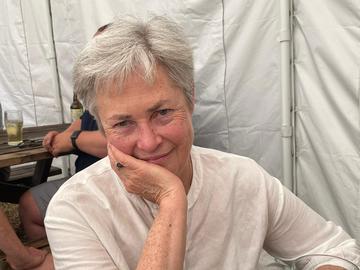
Carolyn Jenkins
She has now taken over leadership of the team of gardeners and arborists who are responsible for maintaining the Parks for everyone in Oxford to enjoy while also taking care of around 200 smaller green spaces all over the University estate.
This is not Carolyn's first experience of working for the University - after studying economics at the University of Natal in her native South Africa, she got a job in the Economics Department at Oxford and arrived here in 1992 to work in the Centre for the Study of African Economies, dividing her time between Oxford and the LSE.
She remained here as an academic for about ten years before developing an interest in historic landscapes, and deciding to change career. She completed a degree in Landscape Architecture at Reading University, and was then appointed by the borough council to help lead the team that manages Reading's public parks.
She has now returned to Oxford to take charge of one of the city's most beautiful public spaces, and is interested in finding ways to build on and communicate its long and interesting history while still meeting 21st-century needs. The story of the Parks is often told starting with the University buying the land from Merton college in the mid-19th century, but there are pictures of families walking here and enjoying the riverside landscape from at least a century earlier.
One of her long-term goals is to make the Parks more biodiverse, not just by improving existing wilder areas but also by incorporating more wildlife-friendly plants into mixed borders and other formal horticultural features. At the same time, the Parks team needs to make sure the wide variety of archaeology beneath the Parks is kept safe - the University has commissioned a Conservation Management Plan to ensure this, and once complete this will be implemented.
She would like to work more closely with academic departments, so that world-leading research into plants, climate change and archaeology guides excellence in practice in the University’s public park.
Another aim is to make the Parks team's activities more sustainable, through initiatives like using less water, making buildings more energy-efficient, and moving away from diesel vehicles and equipment and towards battery power - a shift that will also make work safer and more pleasant for staff.
Finally, Carolyn also hopes to improve the general condition of the green spaces around the University estate for which the Parks team is responsible - while most of these are of reasonable quality already, over time she would like to bring them up to a similar level to the most beautiful college gardens.